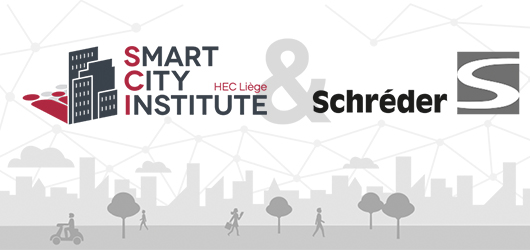Schréder, an intelligent outdoor lighting solutions provider, has become a partner of the Smart City Institute, a non-profit organization that aims to stimulate research, teaching, innovation and entrepreneurship to enable smart cities.
Today, approximately 50% of the world's population lives in urban environments. By 2050, an estimated 70% will live in these areas, putting cities under even greater pressure to provide the necessary infrastructure and services to engage its citizens and help the private sector thrive. A fervent advocate that cities, industry and citizens must work together to help cities wisely navigate the transition to smart technology, Schréder has become partner of the Smart City Institute.
 |
|
Schréder and Smart City Institute (SCI) have formed a partnership to spur the developments of intelligent cities. (Schréder/LEDinside) |
Founded in 2015, by HEC Liège (Business Management School of the University of Liège, Belgium), the mission of the Smart City Institute is to contribute to the general development of smart cities by training the managers of tomorrow, developing research, entrepreneurship and innovation. The institute currently has a network of more than 400 actors (from governments, councils, public and private sector companies, research centers and universities) and supports numerous promising business projects through its City Venture Lab incubator.
At Schréder, we have always strongly supported initiatives which encourage research, knowledge, experience and best practices to be shared, leading to professional and quality lighting installations. We constantly work closely with towns and cities, to develop sustainable solutions that create safe and welcoming environments, where people want to spend time at night.
We continue to assess the challenges that lie ahead in creating smarter cities and in moving towards improved and sustainable public services for citizens. This year, we launched the new Owlet IoT platform. It is not only the most advanced and user-friendly remote management system for luminaires, it also enables cities to easily enter the era of IoT. It collects and transports data coming from all kind of sensors (weather, traffic, air quality…) to enhance the overall performance of the outdoor lighting installation while becoming the central element of a smart environment.
Nicolas Keutgen, Chief Innovation Office of the Schréder Group, explains, “Schréder is fully committed to developing innovative technology to solve the challenges that cities are facing today.
We don’t want to develop technology for technology’s sake. We want to develop solutions that help cities achieve their environmental objectives, facilitate operations and provide services that improve the quality of life for its citizens.
To do so, we must continue to build relationships within the private, public and academic sectors across the world. By joining the Smart City Institute, we want to engage with towns and cities, research centers, technology start-ups, and the future generation to ensure that our solutions really meet their needs.”












